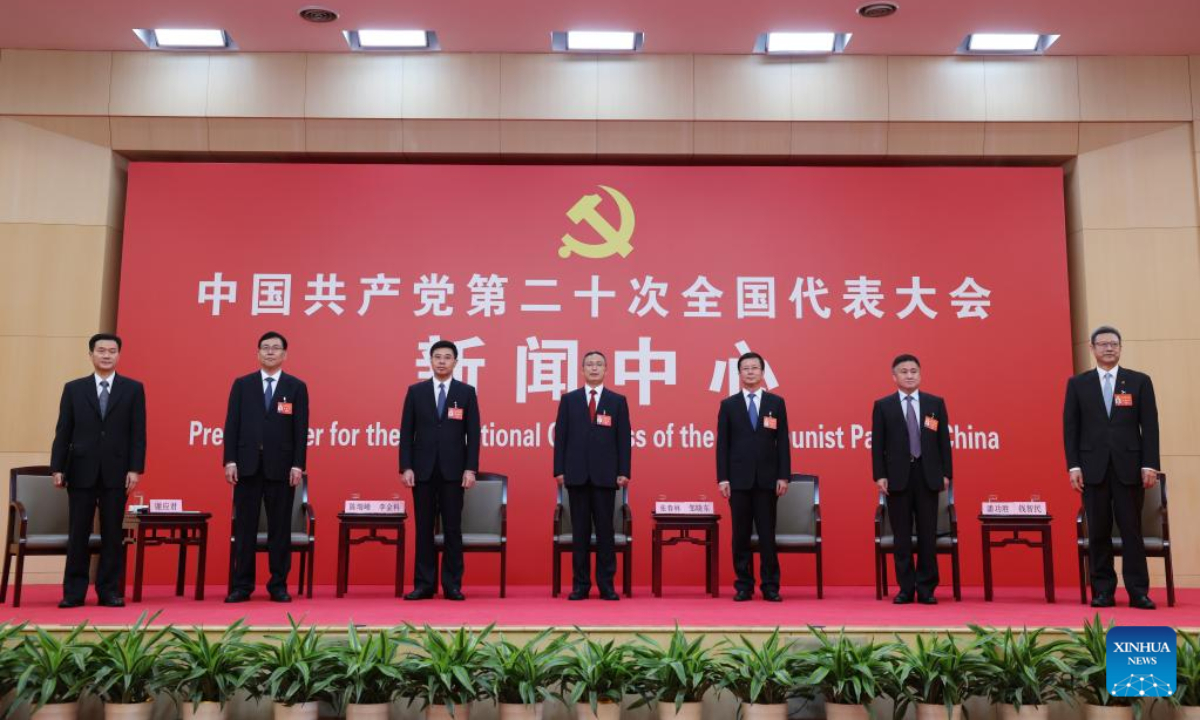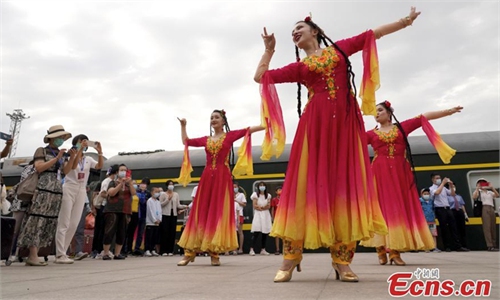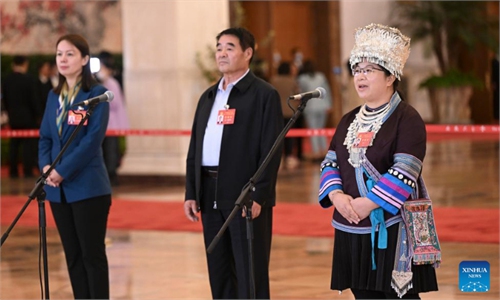
The spokespersons for the delegations from Qinghai, Ningxia, Xinjiang, the central Party and state organs, central financial institutions and central enterprises (in Beijing) to the 20th National Congress of the Communist Party of China (CPC) meet the press during a group interview in Beijing, capital of China, Oct 20, 2022. Photo:Xinhua
Northwest China's Xinjiang Uygur Autonomous Region currently enjoys social stability, ethnic unity, religious harmony and economic growth, and people live and work in peace and happiness, Zhang Chunlin, deputy secretary and head of publicity department of the CPC Xinjiang Regional Committee, said at a press conference on Thursday during the 20th National Congress of the Communist Party of China.
China's Xinjiang region is vast, with magnificent scenery and the people are very friendly, the region's achievements are concrete, laying the foundation for a better future, Zhang said. "Investing in China's Xinjiang region is investing in China's future," Zhang noted.
The region has not seen violent terrorism cases for more than five years, and people's sense of security has significantly risen over the past decade, Zhang stated.
More than 70 percent of the region's financial expenditure has been targeted toward safeguarding and improving living standards, promoting employment, education, medical care, social security and other projects related to people's lives.
Since 2012, urban and rural disposable income in Xinjiang has grown at an average annual rate of 7.9 percent and 9.5 percent respectively. All the 3,666 poverty stricken villages and 35 impoverished counties have been lifted out of poverty, impacting more than 3.06 million people, according to Zhang.
"We have made every effort to promote the construction of power and water supply infrastructure," Zhang said.
Li Wenjuan, a township Party chief in Akto County of Xinjiang region told the Global Times in a previous interview that the quality of youth education has improved significantly. It is easier for herders to access to medical services, and villagers are living in a safe environment. The per capita disposable income of villagers has increased from 3,895 yuan ($540) in 2012 to 15,878 yuan this year through the high-quality development of the tourism and livestock industries, according to Li.
Zuliyati Simayi, a delegate to the 20th National Congress of the Communist Party of China has been to UN multiple times to tell the world about the real Xinjiang.
Over the past decade, the annual GDP of Xinjiang has doubled, and the per capita disposable income has seen similar growth with both hitting record highs. People of all ethnic groups in Xinjiang enjoy a happy life of security, stability, development and progress on an equal footing, Zuliyati told the public. As a scholar, she has witnessed how the higher education in the region has progressed.
Zhang also explained the state of the ethnic unity in the region over the past decade. He said the region was committed to forging a strong sense of community for the Chinese nation, and has included it into teaching curriculums.
Akto County is located in the eastern Pamir Plateau in China's Xinjiang region, bordering Kyrgyzstan and Tajikistan. Li from the Akto County said that in recent years, not only has the infrastructure been improved, but the enthusiasm of all ethnic groups to guard the border has also increased.
The region is consolidating steady economic growth from private industry and investment in the first half of 2022. A combined investment of nearly 355.3 billion yuan ($52.7 billion) was attracted to the region in the first half of 2022, up 37 percent year-on-year, according to the region's commerce department in July.
Xinjiang has demonstrated its irreplaceable status for foreign enterprises. Volkswagen China's then CEO Stephan Wollenstein said in July that the company has made the decision to keep its Xinjiang plant operating after discussions with the company's Chinese joint venture partner, China's state-owned SAIC Group.
From January to July this year, the added value of industries above designated size grew by 8.3 percent year-on-year in China's Xinjiang region, according to the region's statistic bureau.
Global Times



